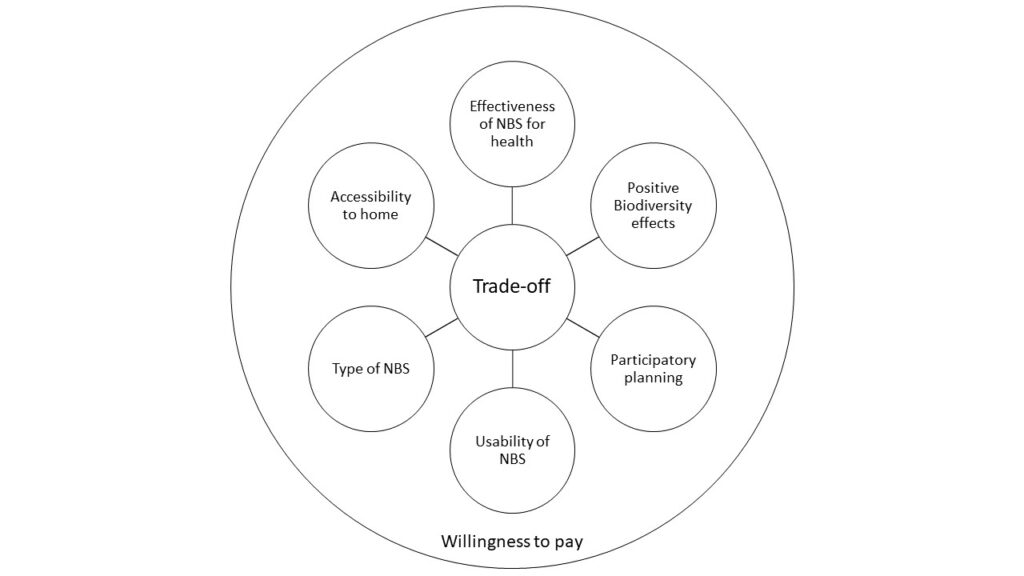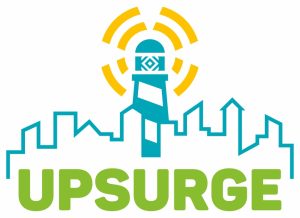The study focuses on the planning phase of nature-based solutions in cities, in which trade-offs have to be made between different options, such as the design, effectiveness, financial contributions from residents or participatory options. Based on the UPSURGE survey and choice experiment, the aim is to assist public participation processes in various countries, help planning teams define priorities and design governance measures which ensure long-term dedication to development plans.
The benefits of nature-based solutions (NBS) are well known – positive ecological impacts that carry many benefits for human health and wellbeing, such as temperature reduction or air quality improvement. However, NBS require both space and investments in our cities. The promotion of NBS in European cities does not only need the support of investors and decision makers but also of the population and residents whose neighborhoods are directly affected. It is important for decision makers to understand, which trade-offs residents are willing to make: While generally assumed that all desire the benefits of effective NBS (supporting temperature reduction, increased biodiversity, improved air quality), it is uncertain if there is also an interest in the usability or participatory design of NBS. Further, If NBS are constructed, it may obstruct accessibility by car to one’s home representing a potential obstacle to their implementation. Finally, it must be determined to what extent the residents are willing to pay for these improvements, as communal charges might have to be raised to ensure adequate maintenance of these green spaces.

Figure 1: Aspects influencing the trade-offs and decision-making process on nature-based solutions
To determine the complex trade-offs citizens are willing to make a survey with an integrated discrete choice experiment was conducted via panel distribution in six countries: Greece, Hungary, Netherlands, Poland, Slovenia and the United Kingdom. The survey thereby consisted of two parts: a general one and the discrete choice experiment. The general survey concentrated on the respondents’ neighborhood, supply and quality of surrounding green areas and attitude and experience with climate change and climate change adaptation measures. The discrete choice experiment concentrated on NBS related trade-offs represented in Figure 1. The data analysis was conducted using SPSS and LatentGOLD.
The initial results have shown, that there is no cookie cutter solution to implementing NBS. We could determine different preferences for the type of green areas, with street greening being the most popular across all nations. General trends in air quality improvement showed similarities between the countries. Biodiversity had little influence on decision making across all countries.
When focusing on temperature reduction however the results show, that in countries experiencing higher temperatures, there is a greater interest in using NBS to combat heat. It was noteworthy that the participation aspect was especially important in Poland, Slovenia and the United Kingdom: For these countries, there was a strong disinterest in solutions proposed that did not include participation in the design process.
The preparedness to reduce accessibility to the home by car was particularly low in the Netherlands, the United Kingdom and Greece. On the other hand, the respondents from Hungary, Poland and Slovenia decision making were not as strongly influenced by accessibility but more so by the effectiveness and type of NBS.
While these initial findings are still generalizations, further research and investigation of subgroups (latent classes) will show differences within the sample. A deeper dive into understanding the cultural differences and differences among the urban population will assist planners and decision makers in understanding the diverse needs of urban populations across Europe.
UPSURGE
UPSURGE bridges the gap between the existing knowledge base on Nature Based Solutions and their step-by-step practical implementation for regenerative development of cities focusing on air pollution alleviation and climate neutrality.
Our main aim is to reroute cities and fast forward their regenerative transition benefiting from the potential of Nature Based Solutions (NBS).
UPSURGE is the response to the challenges faced by cities in their efforts to decrease the impacts of urban existence on climate change, mitigate air pollution and its health effects and reduce climate change stressors.
To help European cities enter the regenerative transition pathway, UPSURGE will provide an EU Urban Regenerative Lighthouse to serve as a reference framework and a reference network to accelerate, transfer and upscale the use of NBS and mainstream them into the agenda of urban policies through co-creation and co-design processes with citizens and other stakeholders.
UPSURGE will provide fit for problem NBS together with supportive digital, and governance solutions for urban space regeneration deployed and tested in 5 real-life demo cities in Europe.
Project details
- Project title: City-centered approach to catalyze nature-based solutions through the EU Regenerative Urban Lighthouse for pollution alleviation and regenerative development.
- Funding scheme: The project has received funding from the European Union’s Horizon 2020 under grant agreement No. 101003818
- Duration: 48 months (1 September 2021- 31 August 2025) extended to 28 February 2026
- Project coordinator: E-ZAVOD, ZAVOD ZA PROJEKTNO SVETOVANJE, RAZISKOVANJE IN RAZVOJ CELOVITIH RESITEV, Slovenia
- Project website: https://www.upsurge-project.eu

